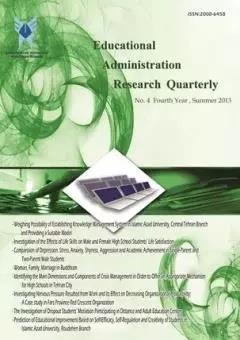Designing a Model for Utilizing Artificial Intelligence in Human Resource Management with a Grounded Data Theory Approach
Subject Areas : Educational managementLeila Kheyrati 1 , S. Shahram SalamatiNia 2 , Soheil Dadfar 3
1 - Department of Information and Communication Technology Management, Kish International Branch, Islamic Azad University, Kish, Iran
2 - Department of Information and Communication Technology Management, Kish International Branch, Islamic Azad University, Kish, Iran
3 - Department of Information and Communication Technology Management, Kish International Branch, Islamic Azad University, Kish, Iran
Keywords: Artificial intelligence, human resource management, grounded theory,
Abstract :
The main objective of this research is to design a model for the application of artificial intelligence in human resource management based on grounded theory. The research method is applied from the perspective of the objective and is qualitative based on data collection using the grounded theory method. Using purposive and snowball sampling methods, semi-structured in-depth interviews were conducted with 15 experts and key informants in the field of artificial intelligence and human resource management and academic experts, and the data were analyzed using open, axial, and selective coding through Max Quda 2020 software. The resulting paradigmatic model was formed based on the central phenomenon (development of artificial intelligence in human resource management) affected by causal conditions including (technological factors, organizational factors, and strategic factors), contextual conditions including (environmental factors, and ethical and social factors), and intervening variables including (human-related factors including components of employee trust and acceptance, user experience, ethical concerns, and skill gaps) along with action and reaction strategies (automation of repetitive tasks, talent acquisition, learning and development, data analysis, interaction with employees, changing human resource roles, collaboration with experts, and investment in technology) and positive and negative consequences.
بهرامی دهدار، معصومه (1403). عوامل پذیرش هوش مصنوعی در مدیریت منابع انسانی،سومین کنگره بین المللی مدیریت، اقتصاد، علوم انسانی و توسعه کسب و کار،https://civilica.com/doc/2051019
بهمنی، پریسا و میرزایی، آرزو و رحیمی، محمد مهدی (1402). بررسی عوامل موثر بر موفقیت مدیریت منابع انسانی الکترونیک،دومین کنفرانس بین المللی اقتصاد و مدیریت کسب و کار با گرایش توسعه دانش بنیان،تهران،https://civilica.com/doc/1780525
اکبری, علیرضا و طهماسبی, رضا . (1401). شناسایی کاربردها و الزامات هوش مصنوعی در فرایند جذب و استخدام. مجله علمی "مدیریت فرهنگ سازمانی", 21(1), 75-88. doi: 10.22059/jomc.2021.320799.1008246
اسلامی، آذر. دانایی فرد، حسن (1390). کاربرد استراتژی پژوهشی نظریه دادهبنیاد در عمل؛ ساخت نظریه بیتفاوتی سازمانی. دانشگاه امام صادق (ع). تهران، چاپ اول.
Abdeldayem, M. M., & Aldulaimi, S. H. (2020). Trends and opportunities of artificial intelligence in human resource management: Aspirations for public sector in Bahrain. International journal of scientific and technology research, 9(1), 3867-3871.
Davenport, T., Guha, A., Grewal, D., & Bressgott, T. (2020). How artificial intelligence will change the future of marketing. Journal of the Academy of Marketing Science, 48, 24-42.
Haenlein, M., Kaplan, A., Tan, C. W., & Zhang, P. (2019). Artificial intelligence (AI) and management analytics. Journal of Management Analytics, 6(4), 341-343.
Harney, B., & Collings, D. G. (2021). Navigating the shifting landscapes of HRM. Human Resource Management Review, 31(4), 100824.
Huang, M. J., Tsou, Y. L., & Lee, S. C. (2006). Integrating fuzzy data mining and fuzzy artificial neural networks for discovering implicit knowledge. Knowledge-Based Systems, 19(6), 396-403.
Jatobá, M., Santos, J., Gutierriz, I., Moscon, D., Fernandes, P. O., & Teixeira, J. P. (2019). Evolution of artificial intelligence research in human resources. Procedia Computer Science, 164, 137-142.
Kearney, C., & Meynhardt, T. (2016). Directing corporate entrepreneurship strategy in the public sector to public value: Antecedents, components, and outcomes. International Public Management Journal, 19(4), 543-572.
Kimseng, T., Javed, A., Jeenanunta, C., & Kohda, Y. (2020). Applications of fuzzy logic to reconfigure human resource management practices for promoting product innovation in formal and non-formal R&D firms. Journal of Open Innovation: Technology, Market, and Complexity, 6(2), 38.
Kurek, D. (2021). Use of modern IT solutions in the HRM activities: Process automation and digital employer branding.
Malik, A., Thevisuthan, P., & De Sliva, T. (2022). Artificial intelligence, employee engagement, experience, and HRM. In Strategic human resource management and employment relations: An international perspective (pp. 171-184). Cham: Springer International Publishing.
Minbaeva, D. (2021). Disrupted HR?. Human Resource Management Review, 31(4), 100820.
Nankervis, A., Connell, J., Cameron, R., Montague, A., & Prikshat, V. (2021). ‘Are we there yet?’Australian HR professionals and the Fourth Industrial Revolution. Asia Pacific Journal of Human Resources, 59(1), 3-19.
Poba-Nzaou, P., Galani, M., & Tchibozo, A. (2020). Transforming human resources management in the age of Industry 4.0: a matter of survival for HR professionals. Strategic HR Review, 19(6), 273-278.
Qamar, Y., Agrawal, R. K., Samad, T. A., & Chiappetta Jabbour, C. J. (2021). When technology meets people: the interplay of artificial intelligence and human resource management. Journal of Enterprise Information Management, 34(5), 1339-1370.
Quan, X. I., & Sanderson, J. (2018). Understanding the artificial intelligence business ecosystem. IEEE Engineering Management Review, 46(4), 22-25.
Rąb-Kettler, K., & Lehnervp, B. (2019). Recruitment in the times of machine learning. Management Systems in Production Engineering, 27(2), 105-109.
Varma, A., Dawkins, C., & Chaudhuri, K. (2023). Artificial intelligence and people management: A critical assessment through the ethical lens. Human Resource Management Review, 33(1), 100923.
Vishwakarma, L. P., & Singh, R. K. (2023). An analysis of the challenges to human resource in implementing artificial intelligence. In The Adoption and Effect of Artificial Intelligence on Human Resources Management, Part B (pp. 81-109). Emerald Publishing Limited.
Zhang, Y., Xu, S., Zhang, L., & Yang, M. (2021). Big data and human resource management research: An integrative review and new directions for future research. Journal of Business Research, 133, 34-50.


